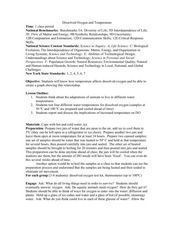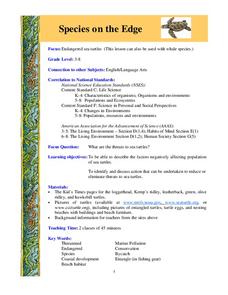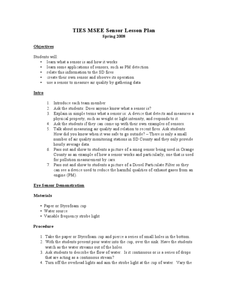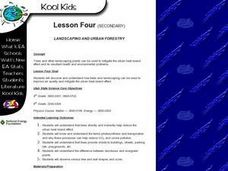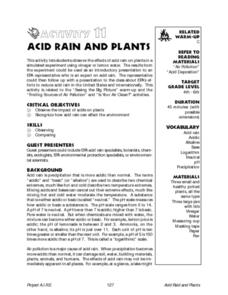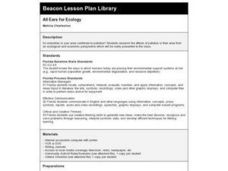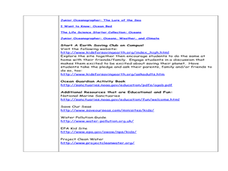Curated OER
Ocean in a Bottle
Learners create an enclosed ocean in a bottle and add different pollutants to explore the effects of pollution on the environment.
Curated OER
Fallout!
Students plot the locations of fallout from two disasters that polluted much of the world's air. They plot the ash fallout from the 1980 Mt. St. Helen's eruption to see what the wind patterns in the United States look like overall. Next...
Curated OER
Break the Tension
Learners experiment with the concepts of surface tension. They participate in a number of different experiments that introduce them to surface tension. They work in a small group in order to conduct these experiments.
Curated OER
Environmental Education
Second graders examine how their choices affect the environment. They identify different types of pollution and its source. They ask questions to end the lesson.
Curated OER
Bean and Ozone Project
Students performed an experiment in which they grew beans in an ozone chamber and some in regular air in order to see if the ozone causes damage to the plants.
Curated OER
Dissolved Oxygen and Temperature
Young scholars are shown how temperature affects dissolved oxygen and they create a graph showing this relationship. They think about the adaptations of animals to live in different water temperatures. Students test four different water...
Curated OER
Fossil Fuels: Facing the Issues
Young scholars explore energy by researching fuel usage on Earth. In this fossil fuel lesson, students define fossil fuels, the energy created by burning them, and the impact on the environment when using them. Young scholars conduct...
Curated OER
Polluted Rain
Young scholars identify and analyze how acid rain can affect the environment. They then explain how air, water, and pollution interact and conduct pH tests to find acidity levels in water. Finally, students become "Pollution Watch...
Curated OER
Species on the Edge
Young scholars study science. In this endangered species lesson, students examine sea turtles and actions that can be taken to help keep them alive. They work in small groups to research different species of turtles and share their...
Curated OER
Evaporation and Condensation
Students explore how temperature affects the processes of evaporation and condensation.
Curated OER
TIES MSEE Sensor Lesson Plan
Students explain how a sensor works. In this technology lesson, students determine the air quality around their school. They record observations and share results to class.
Curated OER
Building a Healthy City (Final Project)
Pupils construct a scaled model of a city that provides for the economic and cultural needs of a community while maintaining high quality air and water to protect the public health. They articulate, in a presentation, the locations of...
Curated OER
Landscaping and Urban Forestry - Lesson 4 (Grades 5-6)
Students discuss reasons to plant trees and the best locations for cooling. They analyze two homes identifying types and locations of trees, and location of the central air conditioners. The benefits of shade, the process of...
Curated OER
Landscaping And Urban Forestry - Lesson 4 (Grades 8-9)
Students discuss reasons to plant trees and the best locations for cooling. They study two homes and identify types and locations of trees and determine the placement of the central air conditioners. The class plans a landscape design...
Curated OER
Dripping Wet or Dry as a Bone?
Students use a sponge and water model to explore the concept of relative humidity and create a percent scale. They define humidity and saturation, build a simple humidity/saturation model, collect, predict and interpret data, and create...
Curated OER
Acid Rain
Students perform experiments to determine how different acids cause acid rain. They measure the pH of the water to calculate the water's acidity. They discover how acid rain dissolves rock materials.
Curated OER
The Urban Heat Island Effect - Lesson 2 (Grade 5)
Fifth graders use the scientific process to examine how when various surfaces are exposed to similar environmental conditions, surface temperatures may vary. They conduct an experiment to show the relationship between surface and...
Curated OER
Environmental Responsibility
Young scholars discuss the importance of recycling and preventing pollution. In groups, they complete mini-studies on various environmental issues and evaluate different consumer products. They use global warming data to determine the...
Curated OER
Acid Rain And Plants
Students observe the effects of acid rain on plants. They simulate an experiment using vinegar or lemon water. They observe the impact of acids on plants and recognize how acid rain can affect the environment. They examine their plants...
Curated OER
All Ears for Ecology
Fourth graders research to see the effects that air pollution has on where they live. They explore improper dumping of waste run-off, air pollution, and water pollution.
NOAA
The Dead Zone
The fifth installment of a 23-part NOAA Enrichment in Marine sciences and Oceanography (NEMO) program defines dead zones and how they form. Pupils then examine data from the Gulf of Mexico to determine dead zone formation.
Illinois Department of Natural Resources
Section Four: How Can We Protect Biodiversity?
Look into the future with a lesson plan on biodiversity and natural habitats. Learners read articles about different perspectives when it comes to planning future development, and decide which angle is the highest priority in a group...
Curated OER
Examining a Hazardous Waste Site
Students identify activities that produce hazardous waste. They examine how contaminants are spread in air and water. They work together to create a model to show how the contaminants move through water.
Curated OER
I Can Preserve My Planet
Students explore renewable and nonrenewable resources. In this ocean preservation lesson, students use KWL charts to understand ways the ocean is important to our daily lives. Students create a poster or wirte a letter to someone...







